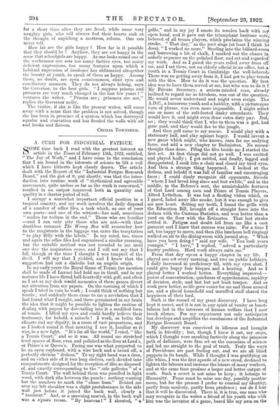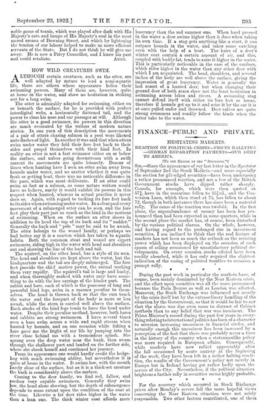A CURE FOR INDUSTRIAL FATIGUE.
QOME time back I read with the greatest interest an article in the Times of February 15th, 1922, entitled, "The Joy of Work," and I have come to the conclusion that I am bound in the interests of science to lift a veil which I have hitherto kept closely drawn. The article dealt with the Report of the "Industrial Fatigue Research Board," and the gist of it, put shortly, was that the intro- duction into routine work of "rhythmical and agreeable movements, quite useless so far as the work is concerned," resulted in an output improved both in quantity and quality in a shorter period of toil. I occupy a somewhat important official position in a tropical country, and my work involves the daily disposal of a number of office files, a task which, as one of your own poets—and one of the wittiest—has said, sometimes "makes for tedium in the end." Those who are familiar —and I can only pity those who are not—with that deathless romance The Wrong Box will remember how to the magistrate in the luggage van came the temptation "to play Billy with the labels." In my mind, too, times and again the office files had engendered a similar yearning, but the suitable method was not revealed to me until one day the inspiration came, and I will not say that I fell, though at the time I thought I was tempted of the devil. I will say that I yielded, and I know that the suggestion had not a diabolic but an angelic origin. In my early years the Royal Game of Tennis (no mention shall be made of Lawns) had held me in thrall, and in my maturer life I have flirted half-heartedly with golf, and often as I sat at my desk would memories of these games divert my attention from my papers. On the morning of which I speak I tried in vain to work ; I could think of nothing but tennis ; and suddenly there came to me a revelation that I had found what I sought, and there germinated in my brain the idea that it might be possible to lighten the routine of dealing with papers by dovetailing into it a modified form of tennis. I lifted my eyes and could hardly believe their testimony, for behold, a miracle ! I work, as befits the climate and my dignity, in a room of vast proportions, and as I looked round it that morning I saw it, familiar as it was, in a new light. "It's for all the world," I cried, "like a Tennis Court," and so it was. All round me stretched level spaces of floor, even and polished as the floor at Lord's, or Prince's or Queen's. Facing me was what purported to be an open cupboard, with a wire back and a broad sill, a perfectly obvious " dedans." To my right hand was a door, and on either side of it two long shelves, each divided into compartments designed for the reception of files as disposed of, and exactly corresponding to the "side galleries" of a Tennis Court. The wall behind them was panelled in light wood, with dark ribs between the panels : nothing wanting but the numbers to mark the "chase lines." Behind me over my left shoulder was a slight protuberance in the aide wall just before it joined the back wall, clearly a "tambour." And, as a crowning marvel, in the back wall was a square recess. "By heavens 1" I shouted, "a 4 grille," and in my joy I smote its wooden back with my' open hand, and it gave out the triumphant baritone note, beloved of all tennis players, which proclaims the winning stroke. "That day," as the poet sings (at least I think he does), "I worked no more." Stealing into the billiard-room and borrowing a bit of chalk, I marked out the chases in orderly sequence on the polished floor, and sat and regarded', my work. And as I gazed the years rolled away from off'. me, and I sat there, not an elderly official in an office, but a I youth in a Tennis Court in Cambridge the well-beloved.; There was no getting away from it, I had got to play tennis with the files. How to do it was the question. My first; idea was to have them served at me, but 'who was to do it.? My Private Secretary, a serious-minded man, already, inclined to regard me as frivolous, was out of the question.J He would never understand and might even resign. The A.D.C., a humorous youth and a babbler, with a picturesque turn of phrase, was even more impossible. I might select one or more of the soft-footed dusky attendants. They. would love it, and might even draw extra duty pay. But,: no ; they would think that I, who to them was a god, had gone mad, and they would flee to the jungle. And then golf came to my rescue. I would play with a stationary ball, and play against bogey. I would invent a new game which might, who knows, earn for me undying fame, and add a new chapter to Badminton. No sooner thought than done. Piling the files beside me I started the first set. At first things did not go well. I was excited ' and played badly ; I got rattled, and finally, fagged and disappointed, I sank into a chair and closed my tired eyes.! And then a strange thing happened. I looked at the dedans, and behold it was full of familiar and encouraging faces ; I could dimly recognize old opponents, friends "whom I had loved long since and lost awhile," and in the middle, in the Referee's seat, the unmistakable features of that Lord among men and Prince of Tennis Players, Alfred Lyttelton. It was but a fleeting vision which, as I gazed, faded away like smoke, but it was enough to give me new heart. Setting my teeth, I found the grille with the Education Bill, brought off a straight force into the dedans with the Customs Statistics, and won better than a yard on the floor with the Estimates. That last stroke settled it. Fatigue and doubt fell from me like a cast garment and I knew that success was mine. For a time I sat, too happy to move, and then (the luncheon bell ringing) walked on air to the dining-room with jocund step. "What have you been doing ? " said my wife. "You look years younger." "I have," I replied, "solved a particularly knotty problem. Hard work always suits me."
From that day opens a happy chapter in my life. played one set every morning, and two on public holidays. I daily increased in proficiency till, with my eyes shut, I could give bogey four bisques and a beating. And as I played better I worked better. Everything improved— power of concentration, quickness of apprehension, rapidity of decision, style, and last but not least temper. And as work grew better, so life grew easier for me and those around me, and a placid household and unruffled staff shared the happiness of their lord.
Such is the record of my great discovery. I have long kept it secret, and it is not in any spirit of vanity or boast- fulness but in the interests of human welfare that I now break silence. For my experiment not only anticipates but develops and amplifies the conclusions of the Industrial Fatigue Research Board.
My discovery was conceived in idleness and brought forth in frivolity ; but, though I knew it not, my steps, which I thought were sneaking furtively along the primrose path of dalliance, were firm set on the macadam of science and led me straight to the goal of truth. Truly the ways of Providence are past finding out, and we are all blind puppets in its hands. While I thought I was gratifying an idle whim, I was the first apostle of a new creed, destined to lighten the labours and increase the leisure of many workers, and at the same time produce a larger and better output of work. Such a secret is not mine to keep ; it belongs to Humanity. Fame must be mine one day, possibly posthu- mous, but for the present I prefer to conceal my identity, partly from modesty, partly from prudence ; nor do I fear that it will be discovered. There is, it is true, one man who may recognize in the writer a friend of his youth who with him was the inventor of a game, based like my own on the noble game of tennis, which was played after dark with His Majesty's cats and lumps of His Majesty's coal in the most sacred arcane of Downing Street, and which by lightening the tension of our labour helped to make us more efficient Eervants of the State. But I do not think he will give me away. He is now a Privy Councillor, and I know his past



































 Previous page
Previous page